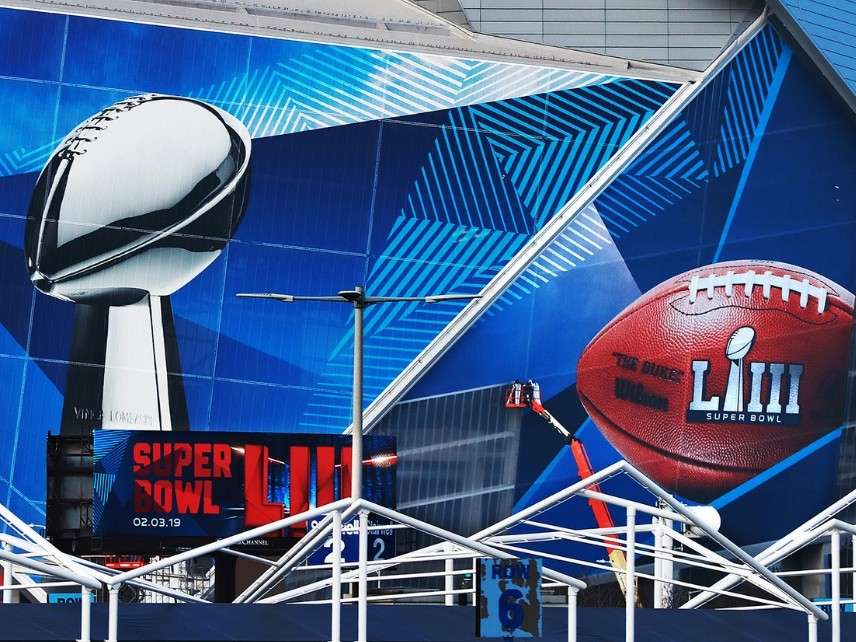CBS Won't Air Medical Marijuana Ad During the Super Bowl
Blame misguided federal policies, not the network.

CBS says it won't air an ad touting the benefits of medical marijuana during Super LIII on February 3. The network's decision, while understandable, serves as more proof that the era of marijuana prohibition is far from over.
The goal of the ad from Acreage Holdings, a marijuana investment firm, was to "create an advocacy campaign for constituents who are being lost in the dialogue," Acreage President George Allen told Bloomberg. "It's hard to compete with the amount of attention something gets when it airs during the Super Bowl," he added.
It's a valid point, as the Super Bowl is usually the most-watched television event of the year. Last year's game drew a whopping 104.3 million viewers, which was actually down 7 percent from 2017. Those massive viewership numbers mean ad time costs a pretty penny—upward of $5 million for a 30-second commercial.
Acreage was willing to pay that and more, as they hadn't decided whether to run a 30-second ad or a 60-second one during the big game. But it won't end up mattering. "CBS will not be accepting any ads for medical marijuana at this time," the network wrote in a return email after receiving storyboards from Acreage's ad agency, according to USA Today. A CBS spokesperson confirmed to the outlet that the network does not allow marijuana-related ads.
It's not hard to understand CBS's decision. While marijuana is legal for recreational or medical use in 33 out of 50 states, it's still classified by the Drug Enforcement Administration (DEA) as a Schedule I drug under the Controlled Substances Act. Pot prohibition may be collapsing, as Reason's Jacob Sullum argued in November, but federal law has not yet caught up.
That not to say there hasn't been progress. In June, the DEA approved Epidiolex, an epilepsy drug containing cannabidiol (CBD), as a medical treatment. And in September, the agency reclassified Epidiolex as a Schedule V drug, which is the least restrictive category for controlled substances. Plus, while former Attorney General Jeff Sessions was an enemy of legal marijuana (among many other things), the man nominated to replace him, William Barr, says he won't target state-licensed marijuana businesses.
The fact remains, however, that marijuana is still illegal under federal law. This means, as Barr noted in his confirmation hearing, that the current conflict between federal prohibition and state legalization is "untenable."
This conflict manifests itself in the affairs of some companies. The NFL, for instance, still prohibits its players from using marijuana, even though recreational weed is legal in eight of the 32 states the league plays in. As Reason's Eric Boehm pointed out Sunday, this policy remains in place largely because team owners see the policy as a bargaining chip. However, it's not hard to imagine that if weed were legal (or at least not outright banned) under federal law, the owners wouldn't have this leverage.
Similarly, CBS probably wouldn't have had a problem airing a pro-medical marijuana ad if federal law regarding the matter was less stringent. After all, polling shows that the vast majority of Americans believe medical marijuana should be legal. Considering the conflicts between federal and state laws, however, the network probably decided it was better to stay out of it.
Acreage, for its part, seems to understand the situation. "We're not particularly surprised that CBS and/or the NFL rejected the content," Allen told USA Today. "And that is actually less a statement about them and more we think a statement about where we stand right now in this country."
It's unfortunate nonetheless. The ad was more a "call to political action" than a commercial for the company itself, Acreage told Bloomberg. "We're not marketing any of our products or retail in this spot," Chief Marketing Officer Harris Damashek added to USA Today. The 60-second version of the ad introduced three people who have benefited from medical marijuana, including a young boy suffering from seizures and a military combat veteran who lost part of his leg.
While the ad won't air during Super Bowl, people will still be able to see it. The company plans to post it online once it's out of production.


Show Comments (14)